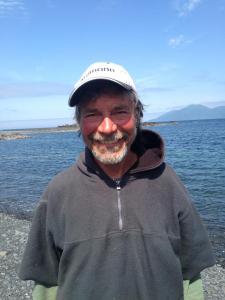David Little

West Side Stories
These oral histories chart the personal stories of individuals with a longtime connection to the west side of Kodiak Island, defined for the scope of this project as the area buffeted by the Shelikof Strait that stretches from Kupreanof Strait south to the village of Karluk. The project endeavored to create historical primary source material for a region that lacks substantive documentation and engage west side individuals in the creation of that material.
David Little was interviewed by Anjuli Grantham on June 19, 2015, at Surf City in Uganik Bay, Alaska, as part of the Kodiak Historical Society’s West Side Stories project. David Little was born in San Antonio, Texas, in 1952 but was brought up in Southern California, moving to Alaska at the age of 29. He quit a career as a research psychologist at the Department of Defense and, through various personal encounters, worked in a cannery in Anchorage and then Kodiak and fell into the area’s setting community, buying his first permit with his wife Lisa in 1985. He recounts the different characters he worked with in the cannery and in fishing and shares many anecdotes of the diverse people he has encountered in the area, the difficulty of making any money at the start of his fishing career, and the lifestyle that seasonal fishing enables. He describes how Kodiak has changed since the early 1980s, such as the disappearance of a party atmosphere when the king crab fishery and its big money stopped, the increase in families living in the area, and the impact that new communication technologies have had, noting how the cannery had acted as the community’s social hub for many residents and their connection to the outside world. He describes how fishermen negotiate the boundaries of their sites and work with their neighbors, changes in gear and boats and the impacts it has had on product quality, the differences in mentality between seining and setnetting, and the impact on competitive pricing from the decline in the number of processors. Little also touches on his experiences his experiences building his house and living on Refuge land, the 1980s seining strikes, the Exxon Valdez oil spill, and the impact of IFQs on his fishing.
Please Note: The oral histories in this collection are protected by copyright and have been created for educational, research and personal use as described by the Fair Use Doctrine in the U.S. Copyright law. Please reach out Voices@noaa.gov to let us know how these interviews are being used in your research, project, exhibit, etc. The Voices staff can help provide other useful resources related to your inquiry.
The NOAA mission is to understand and predict changes in climate, weather, oceans, and coasts, to share that knowledge and information with others, and to conserve and manage coastal and marine ecosystems and resources. The Voices Oral History Archives offers public access to a wide range of accounts, including historical materials that are products of their particular times, and may contain offensive language or negative stereotypes.
Voices Oral History Archives does not verify the accuracy of materials submitted to us. The opinions expressed in the interviews are those of the interviewee only. The interviews here have been made available to the public only after the interviewer has confirmed that they have obtained consent.
